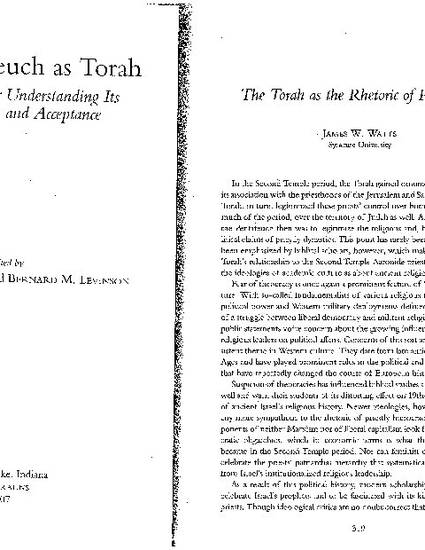
Contribution to Book
The Torah as the Rhetoric of Priesthood
Religion - All Scholarship
ORCID
James W. Watts: 0000-0002-4872-4986
Document Type
Book Chapter
Date
1-1-2007
Keywords
- Torah,
- Pentateuch,
- Priesthood,
- Hebrew Bible,
- Second Temple Judaism,
- rhetoric
Language
English
Disciplines
Description/Abstract
In the Second Temple period, the Torah gained scriptural authority through its association with the priesthoods of the Jerusalem and Samaritan temples. The Torah, in tum, legitimized these priests' control over both the temples and, for much of the period, over the territory of Judah as well. An original function of the Pentateuch then was to legitimize the religious and, by extension, the political claims of priestly dynasties. This point has rarely been discussed and never been emphasized by biblical scholars, however, which makes the subject of the Torah's relationship to the Second Temple Aaronide priesthood as much about the ideologies of academic culture as about ancient religious history.
Source
local input
Creative Commons License
Creative Commons Attribution-Noncommercial-Share Alike 3.0
Citation Information
James W. Watts, “The Torah as the Rhetoric of Priesthood,” in The Pentateuch as Torah: New Models for Understanding Its Promulgation and Acceptance, edited by Gary N. Knoppers and Bernard M. Levinson, Winona Lake, IN: Eisenbrauns, 2007, 319-332.

Pages 319-331 from The Pentateuch as Torah: New Models for Understanding Its Promulgation and Acceptance, edited by Gary N. Knoppers and Bernard M. Levinson, Winona Lake, IN: Eisenbrauns, 2007, available at http://www.eisenbrauns.com/item/KNOPENTAT. Reproduced by permission of the publisher.